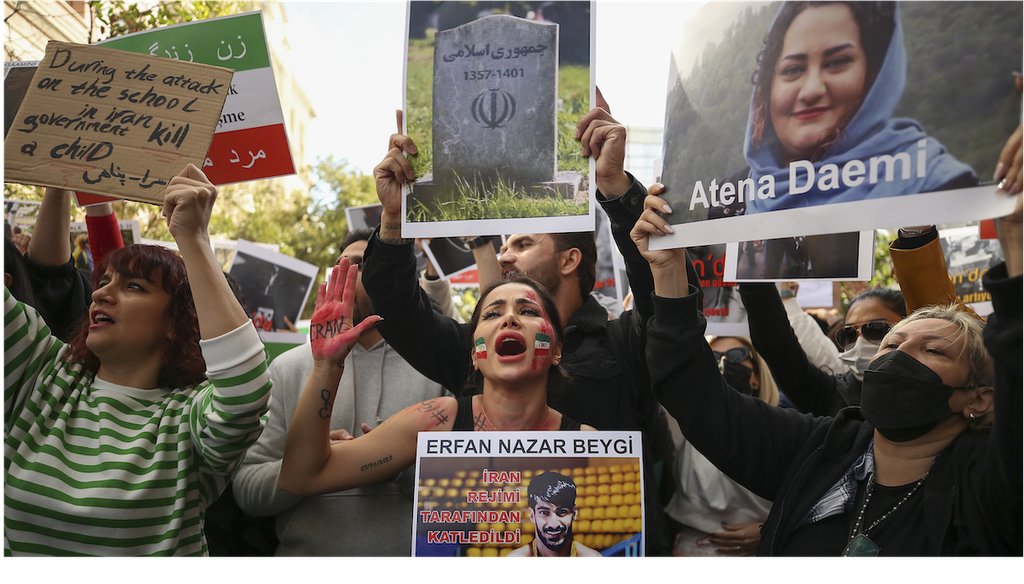Get PolitiFact in your inbox.
Iran protests (further) scuttle nuclear deal

Iranian women shout slogans to protest over the death of Mahsa Amini during a demonstration outside the Iranian consulate in Istanbul, Turkey, Monday, Oct. 17, 2022. (AP)
The prospects of a revived nuclear agreement with Iran are dim. After a summer when negotiators seemed to be resolving the last few stumbling blocks, September saw the same problems return.
Now, weeks of protests in Iran over the death of a young woman arrested by the state's morality police have pushed a deal even further out of reach. The Biden administration responded to the protests by imposing new economic sanctions on Iran.
U.S. State Department spokesman Ned Price said striking a deal on what is called the Joint Comprehensive Plan of Action (JCPOA) is not the administration's focus right now.
"The Iranians have made very clear that this is not a deal that they have been prepared to make," Price said in an Oct. 12 press briefing. "A deal certainly does not appear imminent. Iran's demands are unrealistic; they go well beyond the scope of the JCPOA."
Iran has highlighted two matters, and both are problematic.
Iran would like a guarantee that the U.S. won't back out of the deal again. Former President Donald Trump made that move in 2018, despite his own State Department's report that Iran was in compliance. President Joe Biden can't make that promise, because the agreement is not and never was a treaty. A treaty requires the approval of two-thirds of the Senate, and that is not in the cards with a 50-50 Senate.
Iran also wants the International Atomic Energy Agency to stop investigating uranium traces found at three undeclared sites in Iran. Although the IAEA provides the inspections of Iran's nuclear facilities that lie at the heart of any agreement, it is not a signatory to the agreement itself.
Over the past few months, Iran has gone back and forth on these demands. At times, there were occasional, unofficial hints that Iran had backed off, only to be followed by a public rejection of flexibility.
Iran may have dropped a third demand, that the U.S. stop listing the Islamic Revolutionary Guard as a terrorist organization, but that requirement, too, might remain on the table.
Matthew Kroenig, professor of government and foreign service at Georgetown University, credits Biden with making a good-faith effort to revive the agreement.
"The biggest hurdle to a deal is that Tehran is divided," Kroenig said. "The Supreme Leader and those around him are not certain they want a deal at all, regardless of the terms. The two remaining issues of dispute, therefore, are mostly pretexts for Iran to buy time. That is why the IAEA issue has been open, shut and open again."
Kroenig said his concern is that Iran is steadily moving toward acquiring all it needs to produce a nuclear warhead, and "Washington does not have an effective strategy to stop it."
When the 2015 agreement was in force, it bought the international community (China, Russia, the United Kingdom, Germany, France, the U.S. and the European Union) about 15 years of knowing Iran's nuclear program would remain manageable.
Iran had agreed to caps on uranium enrichment and limits on the amount of nuclear material it could stockpile. Iran had also curtailed its use of advanced centrifuges for enriching uranium. In exchange, it was free of most international trade sanctions.
When Trump unilaterally backed out of the deal and reimposed sanctions, Iran waited about a year before ignoring the JCPOA limits. It recently expanded its use of advanced centrifuges that would have been prohibited under the agreement.
Biden still has two years to see whether the 2015 deal can be revived. For now, we rate this promise Stalled.
Our Sources
Council on Foreign Relations, What Is the Iran Nuclear Deal?, July 20, 2022
Mehr News Agency, Iran confirms enrichment at 3rd cascade in Natanz, Oct. 12, 2022
Reuters, Iran racing to expand enrichment at underground plant, IAEA report shows, Oct. 11, 2022
U.S. State Department, Press briefing, Oct. 12, 2022
U.S. State Department, Press Briefing, Sept. 26, 2022
U.S. State Department, Press briefing, Sept. 7, 2022
U.S. State Department, Press briefing, Aug. 30, 2022
U.S. State Department, Press briefing, Aug. 16, 2022
AP, Biden juggles Iran nuke talks as Iranian repression grows, Oct. 5, 2022
Reuters, Iran has dropped some demands for nuclear deal, U.S. official says, Aug. 23, 2022
Reuters, EU's Borrell has received response from Iran in nuclear talks - spokesperson, Sept. 2, 2022
Bloomberg, Blinken Says Revival of Iran Nuclear Deal 'Unlikely' for Now, Sept. 12, 2022
Email exchange, Matthew Kroenig, professor of Government and Foreign Service, Georgetown University, Oct. 7, 2022
